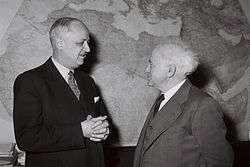Christian Pineau
Christian Pineau (French pronunciation: [kʁistjɑ̃ pino]; 14 October 1904, in Chaumont-en-Bassigny, Haute-Marne, France – 5 April 1995, in Paris) was a noted French Resistance fighter, who later served an important term as Minister of Foreign Affairs in the late 1950s.

Pineau was born in 1904 in Chaumont-en-Bassigny, Haute-Marne, France. His stepfather was the writer Jean Giraudoux, who was married to Pineau's mother. Later, Christian Pineau would say that it was Giraudoux who gave him his love of writing.
A World War II French Resistance leader and a close ally of Charles de Gaulle, Pineau was arrested by the Gestapo in 1943 and survived Buchenwald concentration camp.
Pineau represented the Sarthe department as a Socialist in the French National Assembly from 1946 to 1958. After the war, he served as a minister in French governments, 1945–1958. He was minister of supply in Charles de Gaulle's government (1945) and minister of public works (1947–1950) in various governments.

He was finance minister for a short time in 1948. Pineau was designated as prime minister of France by President René Coty after the February 1955 resignation of Pierre Mendès-France, but the National Assembly refused to ratify his cabinet by 312 votes against 268; his prime ministership lasted for two days between 17 and 19 February 1955.
As foreign minister (February 1956 – May 1958), Pineau was responsible for handling the Suez crisis and for signing the Treaty of Rome on behalf of France. With Guy Mollet, he visited Moscow. In October 1956, he signed the Protocol of Sèvres with Great Britain and Israel on behalf of France.
Pineau was a lifelong advocate of European integration.
Pineau is buried in the Père Lachaise Cemetery, Paris.
Bibliography
Pineau wrote several political books and memoirs:
- La simple vérité, regard sur la période 1940–1945 (the simple truth, a view of the period 1940–45), Editions Julliard
- Khrouchtchev (Khrushchev) Perrin, 1964
- Suez, Robert Laffont, 1976
- Mon cher député, Julliard, 1959
- Le grand pari, l'aventure du Traité de Rome (with Christiane Rimbaud)
He also wrote children's books:
- Plume et le saumon (Feather and the salmon)
- L'ourse aux pattons verts (The she-bear with green paws)
- Histoire de la forêt de Bercé (Story of the Bercé forest)
- La planète aux enfants perdus (The planet of lost children)
| Political offices | ||
|---|---|---|
| Preceded by Paul Ramadier |
Minister of Supply 1945 |
Succeeded by François Tanguy-Prigent |
| Preceded by Jules Moch |
Minister of Public Works and Transport 1947–1948 |
Succeeded by Henri Queuille |
| Preceded by Paul Reynaud |
Minister of Finance and Economic Affairs 1948 | |
| Preceded by Henri Queuille |
Minister of Public Works, Transport, and Tourism 1948–1950 |
Succeeded by Jacques Chastellain |
| Preceded by Antoine Pinay |
Minister of Foreign Affairs 1956–1958 |
Succeeded by René Pleven |